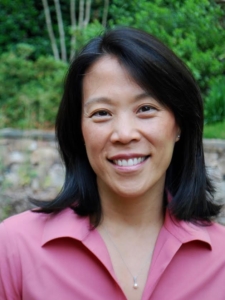 “Change is difficult and hard, but it can also be fascinating and extremely rewarding if you embrace or seek it. Having this perspective has allowed me to grow in my career and my personal life,” says TIAA’s Teresa Burrows. Adapting to change is a learning process, she adds. “You need figure out how to balance both your emotional and logical sides to help successfully lead yourself and others through change.”
“Change is difficult and hard, but it can also be fascinating and extremely rewarding if you embrace or seek it. Having this perspective has allowed me to grow in my career and my personal life,” says TIAA’s Teresa Burrows. Adapting to change is a learning process, she adds. “You need figure out how to balance both your emotional and logical sides to help successfully lead yourself and others through change.”
The Path to TIAA
Burrows is no stranger to change. After graduating from the University of Pennsylvania where she studied economics, Burrows took a different path from her educational background and went to work for Andersen Consulting as a consultant where she was in a variety of roles from software developer to business analyst. Building upon the experience she had at Andersen, Burrows next became a business analyst in the Information Services division of Putnam Investments. After encouragement from her manager to expand and change her role, Burrows soon moved into project management and program delivery, ultimately leading the technology strategy and delivery for International and Institutional Defined Benefit systems.
In 2005, a former manager presented Burrows with the opportunity to relocate to Charlotte NC to come to TIAA and work with her doing IT program delivery. Since joining, she has helped implement numerous technology initiatives for the Institutional business before landing in her current role as a technology program manager in TIAA‘s new Digital organization. She appreciates the challenging, fast-paced, fluid environment. Burrows is proud of the team that she’s assembled, and their ability to adjust to constantly changing priorities and needs. “It is gratifying that I can inspire and motivate them to deliver great work,” she says.
Right now, she’s excited about a recent organizational change that gives the team an opportunity to take on exciting, new projects in different business areas. “I’m excited to transfer the knowledge that we’ve gained from working on the institutional side of the business to the individual/retail side, while forming relationships with my new partners,” Burrows shares.
Role Models Teach Lessons Along the Way
Growing up, Burrows emulated the hard work ethic of her parents, both of whom were Chinese immigrants and successful entrepreneurs. When she started her career, Burrows assumed that keeping her head down and working long hours would foster success, but she’s since found that working “smart” by using the right tools and working collaboratively within a team is more fruitful.
Along the way, Burrows says she benefited from informal mentors, both peers and managers, even some of whom weren’t her own. They offered advice or perspective and helped her advocate for herself while serving as admirable, empathic and honorable role models. “The best manager that I ever had took the time to understand me, my career aspirations, the team and the business, and those are the qualities I try to portray,” she reflects.
She also knows that it’s important to learn from less-desirable situations, noting a time earlier in her career when issues arose on a key project. Rather than communicate their troubles and asking for help, the project leader was instead only concerned with how that would look. As a result, there were fairly significant issues with the delivery of the project. The situation showed her that when there are problems, you have to ask for help. “When you are transparent and open with your business partners, people can put their heads together to form a solution,” she says, noting that your client is likely to respect that strategy and step in and try to be part of the solution.
She says her success over the years has come from strong relationships she’s built with her team, peers and clients, both external and internal. “You can build the relationships you need to be successful by establishing a culture of respect, truly listening to people, offering empathy, following through on actions and being transparent and honest when there are issues or problems,” she says.
Tackling Gender Issues
Although the financial services industry, and in particular IT, are largely male dominated, Burrows has found her path to be largely unencumbered by gender stereotypes. In fact, one surprising situation she remembers occurred during a project she undertook when she was with Putnam. A Japanese partner firm wanted to build a website to provide investment portfolio account information. “While there were a surprising number of gender and cultural considerations that could have impeded on the project’s success, we were able to take these into account and ultimately it went really well,” she says.
At TIAA, she is an active member of the Women’s Employee Resource Group. She appreciates it as a valuable resource for its webinars and events, but particularly because of the networking opportunities that help her connect with women with whom she may not otherwise cross paths.
Life Outside Work
With two sons, ages 13 and 15, Burrows leads an active lifestyle. The family loves to travel and hike and tries to visit a national park each summer, with an upcoming trip to her home state of Massachusetts planned.
